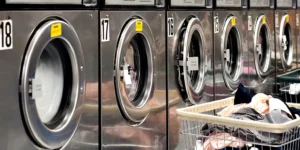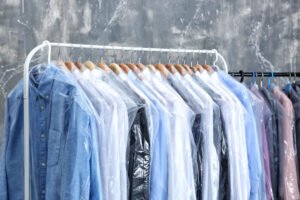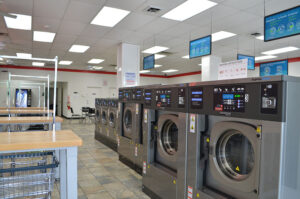The Laundry Dilemma: Convenience or Cost Savings?
Laundry is one of those never-ending tasks that every household and business must deal with. Whether it’s weekly family loads, daily work uniforms, or delicate linens, finding the most efficient and cost-effective way to do laundry is essential.
Many people struggle with the choice between investing in a home washing machine or using a coin-operated laundromat. Each option has its advantages and disadvantages—so which one actually saves more money?
The answer isn’t as simple as it seems. To truly understand which option is better, we must break down the real costs, hidden expenses, and long-term benefits of both.
Let’s dive into the comparison and find out which method is more budget-friendly for different lifestyles and laundry needs.

Understanding the Costs of Home Washing Machines
At first glance, owning a washing machine and dryer seems like the most cost-efficient option. You don’t have to pay per load, and you can wash your clothes anytime without leaving your home.
However, many people overlook the hidden costs of running a laundry machine at home.
1. Upfront Investment: Buying a Washer and Dryer
Buying a washing machine is a big financial decision. The cost varies depending on the brand, model, and features:
- Basic top-loading washer: $500 – $800
- High-efficiency front-loading washer: $900 – $2,500
- Dryer (gas or electric): $600 – $2,000
- Stackable washer & dryer combo: $1,200 – $3,500
While this is a one-time investment, it takes years to break even compared to using a laundromat.
2. Water and Electricity Bills
Every time you run a wash cycle, it increases your utility bill. Here’s what the costs look like:
- Water consumption per load: 15 – 30 gallons
- Electricity per load: 0.5 – 2.0 kWh
- Dryer energy consumption: 2.0 – 5.0 kWh per load
For an average household that washes 5 loads per week, utility costs add up to:
- Water bill increase: $10 – $25 per month
- Electricity bill increase: $15 – $40 per month
3. Maintenance and Repairs
Home washing machines don’t last forever. Over time, they require maintenance and repairs, which can be costly.
- Common repairs:
- Replacing a washer motor: $200 – $400
- Fixing a clogged drain: $100 – $250
- Replacing a dryer heating element: $150 – $300
- Full replacement of a washer: $500 – $1,500
Even with proper maintenance, most washers and dryers need replacement after 10-12 years, making it a repeating long-term investment.
4. Cost of Detergent, Fabric Softener, and Stain Removers
Owning a washer and dryer also means buying your own laundry supplies, including:
✔️ Detergent – $10 to $25 per bottle
✔️ Fabric softener – $6 to $15 per bottle
✔️ Stain removers – $4 to $10 per spray
✔️ Dryer sheets or wool balls – $5 to $15 per box
For an average household, laundry supplies cost $15 to $30 per month, adding another $180 to $360 per year to the total laundry expense.
Understanding the Costs of Coin Laundry (Laundromats)
Coin-operated laundromats eliminate the need for purchasing and maintaining a washer and dryer at home. Instead, you pay per load whenever you need to do laundry.
But is it really cheaper than home washing? Let’s break it down.
1. Cost Per Load at a Laundromat
Laundromat prices vary depending on location, washer size, and drying time, but here’s a general cost breakdown:
- Small washer (single load): $2.50 – $4.00 per wash
- Medium washer (double load): $5.00 – $7.50 per wash
- Large washer (triple load): $8.00 – $12.00 per wash
- Dryer usage (per 10 minutes): $0.25 – $1.00
For an average household that washes 5 loads per week, the monthly laundromat cost is:
✔️ Washing costs: $40 – $80 per month
✔️ Drying costs: $15 – $30 per month
✔️ Total monthly cost: $55 – $110
2. No Maintenance or Utility Bills
One of the biggest advantages of using a laundromat is zero maintenance costs. Since the machines are owned and maintained by the laundromat, you don’t have to worry about:
✔️ Repairs and replacements
✔️ Rising water and electricity bills
✔️ The upfront cost of buying a machine
3. Faster Laundry Time with Large Machines
Unlike home washers, laundromats offer extra-large machines that allow users to wash multiple loads at once.
Instead of waiting hours to finish multiple loads at home, laundromat customers can wash and dry everything in under an hour, saving time and effort.

Which Option Saves More Money? Home Washing vs. Coin Laundry
Scenario 1: Small Household (1-2 People)
- Laundry Frequency: 3 loads per week
- Home Washing Costs: $20 – $40 per month (utilities & supplies)
- Laundromat Costs: $35 – $60 per month
💡 Winner: Home Washing is slightly cheaper for small households, especially if the washing machine is already paid for.
Scenario 2: Medium-Sized Family (3-5 People)
- Laundry Frequency: 5-7 loads per week
- Home Washing Costs: $30 – $60 per month
- Laundromat Costs: $55 – $110 per month
💡 Winner: Home Washing remains more cost-effective, but only if maintenance and machine lifespan are considered.
Scenario 3: Large Family or Heavy Laundry Users (6+ People)
- Laundry Frequency: 10+ loads per week
- Home Washing Costs: $50 – $100 per month
- Laundromat Costs: $100 – $200 per month
💡 Winner: Home Washing is the better investment for large families. However, laundromats save time by washing all loads at once.
Scenario 4: Apartment Dwellers & Short-Term Renters
- No space for a washer/dryer
- No long-term investment needed
💡 Winner: Laundromat is the best choice for renters, apartment residents, and people without in-unit laundry access.
Final Verdict: Which One Is Right for You?
Both home washing machines and coin laundromats have their own advantages and cost considerations.
✔️ Choose Home Washing If:
- You own a home and plan to stay long-term
- You do laundry frequently and have a large family
- You want full control over washing schedules
✔️ Choose Coin Laundry If:
- You live in an apartment or rental unit
- You want to avoid the cost of machine repairs and utilities
- You need a quick, time-efficient way to do laundry
Regardless of your choice, understanding true costs and benefits will help you make the smartest financial decision for your laundry needs.






